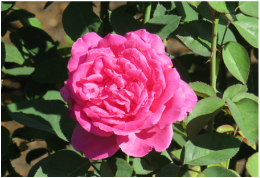 Sunday, November 20, marked the end of the Extraordinary Jubilee Year of Mercy which began on December 8, 2015. It was good for us to reflect upon and pray for the grace of mercy this past year because even though mercy is offered to us by God daily we seem to have a difficult time recognizing it and subsequently passing it on. We have great need for mercy, and yet we struggle with it because of our human weakness. It is rather obvious that the world is sorely in need of this grace and that we have a lot of work to do in this regard. But this past year helped us to see why we must never lose hope: God will never run out of mercy, and as a result we can turn to God and ask Him to supply it for us when we are not feeling particularly merciful. This is one of the reasons why having a year designated to the remembrance and practice of mercy was so important. But now that the Jubilee year is over, and the liturgical year is ending with the season of Advent about to begin, we must not stop thinking about, praying for, or practicing the virtue of mercy. It is not something that ever goes in or out of season: mercy is always in season. This week we celebrate the national holiday of Thanksgiving. In the midst of all the food, friends and family, the most obvious part of our celebration is (hopefully) gratitude. Therefore, while giving thanks for the many blessings in our lives it would be appropriate this year to give thanks for the great mercy of God poured out to us without any limitations. It would also be good to give thanks for being able to tap into this incredible grace in our daily lives so that we can offer it to others. That we have been given the ability to act with mercy means that we have the ability to act as God acts, to act the Gospel way, the way Jesus acted during His life. 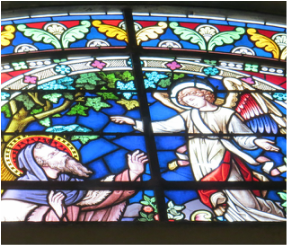 If we really reflect upon what it is, we see that like all grace, mercy is a great power. To have mercy is to have the power to withhold forgiveness, to lord it over the other, to say whatever I want to no matter the effect, and to choose to do the opposite because of the Love we have learned from Jesus. Mercy provides the ability to forgive, to reach out to those who are different, who hold different viewpoints or ways of thinking than we do, (those who might have different values than our own), and to see them and value them as they are, responding with openness and compassion in spite of differences. During His life Jesus never saw a pagan gentile, a woman, a leper, a person with a disability, a Samaritan, a Jewish official (Sadducee or Pharisee), a foreigner, a person rich or poor, a sinner or saint, from whom He withheld mercy simply because they were different than He was. The truth is that He is different from everyone, because He is perfect, given that He is both fully human and fully divine. And even though He knew that He would never receive the same mercy which He offered His people, Jesus never compromised the mercy He gave even while dying on the cross. My reflection upon the end of the Year of Mercy began in Nazareth while traveling in the Holy Land last month. At the Basilica of the Annunciation I passed through a door which was designated as a Holy Door, often referred to as Doors of Mercy. These are doors which are ordinarily sealed shut and are offered as ways to make a pilgrimage (for locals) without having to go to Rome. There were doors designated as Doors of Mercy all over the world. It is not that the door conveys a grace: doors are metal or wood and to think they convey anything is superstitious. But what the demarcation of a Holy Door provides is a reminder and a call to prayer for the grace of mercy. Our gestures speak loudly, so to have special doors opened to remind us of mercy, encouraging our prayer and good works, sends a message that we can open the doors of mercy to others and that all are always welcomed to seek mercy before God. Closing the door does not mean we stop mercy, however. The closing of the door reminds us that we take out of that door what we entered in to seek. The closing of the doors is a symbolic gesture: mercy is always offered by God, always offered by the Church, and always a grace we ask from God to help us in our daily lives. Therefore the closing of the doors is a reminder of our gratitude. Pope Francis said: “[A]s we seal the Holy Door, we shall be filled, above all, with a sense of gratitude and thanksgiving to the Most Holy Trinity for having granted us an extraordinary time of grace. We will entrust the life of the Church, all humanity, and the entire cosmos to the Lordship of Christ, asking Him to pour out His mercy upon us like the morning dew, so that everyone may work together to build a brighter future.”* 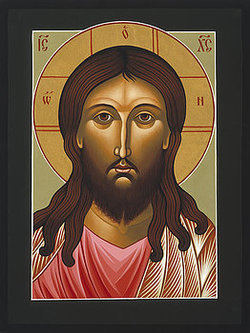 The Jubilee Year was designed to end as the liturgical year closes and this is why it ended on the last Sunday of the year, the Feast of Christ the King. The following Sunday is the first Sunday in Advent: a new year, a new liturgical season, a deeper reflection upon our readiness for the King of Mercy to enter our world in a new way, through us. I cannot think of a year in my life when this was more needed. We have been given a wealth of mercy, and therefore we should continue to include reflection upon it during Advent and beyond. We might begin by asking ourselves how we are called through our words and deeds to bring the Lord of Mercy into the aching world in which we live. Or perhaps we can reflect upon how we can show gratitude to God by exercising the gift of mercy which He has given to us. You see, if we do not use the gift then we are not truly grateful for it. It is like receiving the gift of a sweater which matches little we own: ‘Granny’ made it and gave it to us, and we love her, so we wear it because we do not want to disappoint her. Then we discover that the sweater really is quite useful, and that even if at first the wearing of it was uncomfortable because of the opinion of others, we are growing in the understanding that it was a sign of love from ‘Granny’ which fills us with gratitude and inspires us to give of ourselves to others. While God’s mercy is greater than a sweater, the point is that the more we put it on, the more grateful for it we become because we recognize the great gift of love which it is. And the more we recognize the gift of love, the more we are inspired to share God’s mercy as it has been shared with us, and therefore we might be able to help the world to heal just a little bit at a time. 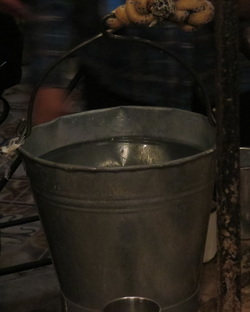 I am not naïve, and certainly God understands the world better than any of us: living mercy is not easy, and others do not always want to receive mercy from us or offer mercy back. Quite often living lives of mercy will get us hurt; after all, look where it got Jesus. However, (and this is important), if we offer mercy where none is offered, if we return good for evil, that is where love prevails and attempts to teach others how to behave. If we offer no love, how do we expect others to learn it? And even if they do not learn anything from us, we are called to imitate the one we follow: Jesus the Lord. We may not see justice lived and shared in this life, but we are called to work for it, not through violence, but through mercy. And we know that God will right all wrongs in the end. We will be judged on how well we loved, which includes how well we offered forgiveness, compassion, mercy, and generously sharing what we have with those who are in need. In the end we will be with Jesus in Heaven forever. We may not experience things going the way we desire them to be in this life, but we do need to trust in God, in His mercy, wisdom and power. And that means we need to cooperate with Him in sharing these graces. So as we end the Extraordinary Jubilee Year of Mercy, the liturgical year, and also celebrate a holiday of gratitude, let us be reminded that mercy is the greatest gift we have received and which we can share. Let us remember that mercy is always in season. Thank God for that. 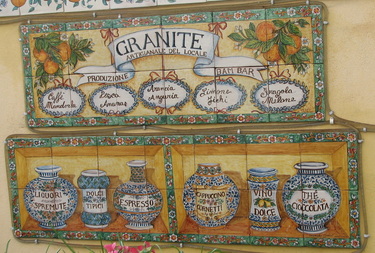 May we be filled with gratitude for the gift of God’s mercy! May we share what we have materially, but especially our mercy, compassion, and love, with those who are in need! May we choose the way of Jesus, the Gospel way of holiness, when we are in situations which challenge us! May we end the liturgical year mindful of that for which we long, the return of Jesus and our entrance into eternal life! May we begin the season of Advent with hopeful expectation, openness of mind and heart, and a spirit oriented to living in mercy! Let us meet in gratitude around the table of the Lord! Peace! ©Michele L. Catanese NOTE: The next post will be on December 5. * The quote from Pope Francis is from Misericordiae Vultus, the document (called a Bull) which declared the Extraordinary Jubilee Year of Mercy. You can find the entire document by clicking on the following link: https://w2.vatican.va/content/francesco/en/apost_letters/documents/papa-francesco_bolla_20150411_misericordiae-vultus.html IMAGES: All of the photos are mine. The first photo was taken in one of the gardens of the Boston Common in Boston, MA, this past September. I chose it because like mercy, beauty is a sign of God's presence. But I also chose it because roses are in season a lot longer than we often realize, but even when they are out of season, they are supplied from other countries where they continue to bloom. I think this is symbolic of how we share mercy with one another, especially when it is needed most. The second photo is a stained glass window I saw while at Mt. Carmel in Israel. The church was a commemoration of where Elijah fled from Jezebel, the evil queen who sought his life when Elijah had done heroic deeds for the Lord. In what is my favorite Old Testament passage, Elijah prays desperately to God while running from Jezebel, asking God to take his life because he feels like he has failed and he is very tired from running. But God in His great love and mercy sends an angel, depicted here, to give Elijah food from Heaven which sustains him until he reaches safety at Mt. Carmel. I love the passage because God not only saves Elijah, but gives him a huge 'dose' of love and care, ultimately giving Elijah friendship, a companion to help him with his mission, and gentleness. (See 1 Kings 18 & 19) The next two photos are from the Basilica of the Annunciation in Nazareth, in the Galilee region of Israel. The photo on the left is the exterior of the Basilica, and the photo to the right is of the very spot where the angel Gabriel appeared to Mary and announced to her that she was to be the Mother of God. Next is an icon by Fr. William Hart McNichols called Jesus Christ Holy Forgiveness. I chose this because the most difficult part of mercy and love is forgiveness. Only Christ the King of the Universe could offer this kind of forgiveness and mercy even after His own people nailed Him to a cross. I love this icon because there is great tenderness in Jesus' eyes, and truly in His entire face. I am not sure why, but His lips speak to me of mercy in this icon. I suppose the gentleness in Jesus' face is the same attribute of God which I love in the Elijah passage mentioned above. If you are interested in obtaining this icon or any others from the work of Fr. Bill, you can find this one at http://fineartamerica.com/featured/jesus-christ-holy-forgiveness-040-william-hart-mcnichols.html and the entire site can be found at http://fineartamerica.com/profiles/william-hart-mcnichols.html?tab=artworkgalleries It is the time of year when we think of giving, so that is why I suggest that you might like to purchase an icon in one of many mediums such as a plaque or giclee to give as a gift. (Remember, I get no financial gain or remuneration for making an endorsement of Fr. Bill's work. I just love to share the beauty!) The next photo is of the pail which is used to draw water at Jacob's Well in Shechem, Israel. It is how we got water out of the well, which indeed still functions. This is the spot where Jacob met his future wife, Rachel, whom he loved with the deepest of loves. The love of Jacob and Rachel is one of the most beautiful and poignant of all the love stories in the Old Testament. This is also the spot where Jesus, in great mercy and love, met the Samaritan woman (John 4) to whom He offered living water. Mercy is living water from Jesus! The last image is a photo I took while in Taormina, Sicily. It was on the wall of a cafe and I fell in love with the tile work, a prominent art form in Sicily. The image of all the jars of spices, nuts, sweets, chocolates and more, made me think of the plenty with which we often feast at Thanksgiving. May your Thanksgiving be sweet and filled with plenty of love and all that is good, and may you be filled with gratitude, as I am in gratitude to those of you who read my posts! Blessings! Comments are closed.
|
Heart Speaks to Heart
|
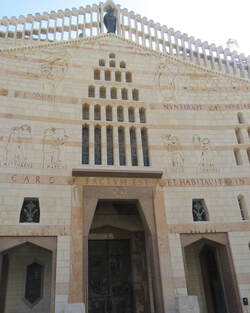
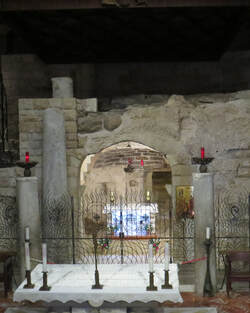

 RSS Feed
RSS Feed

